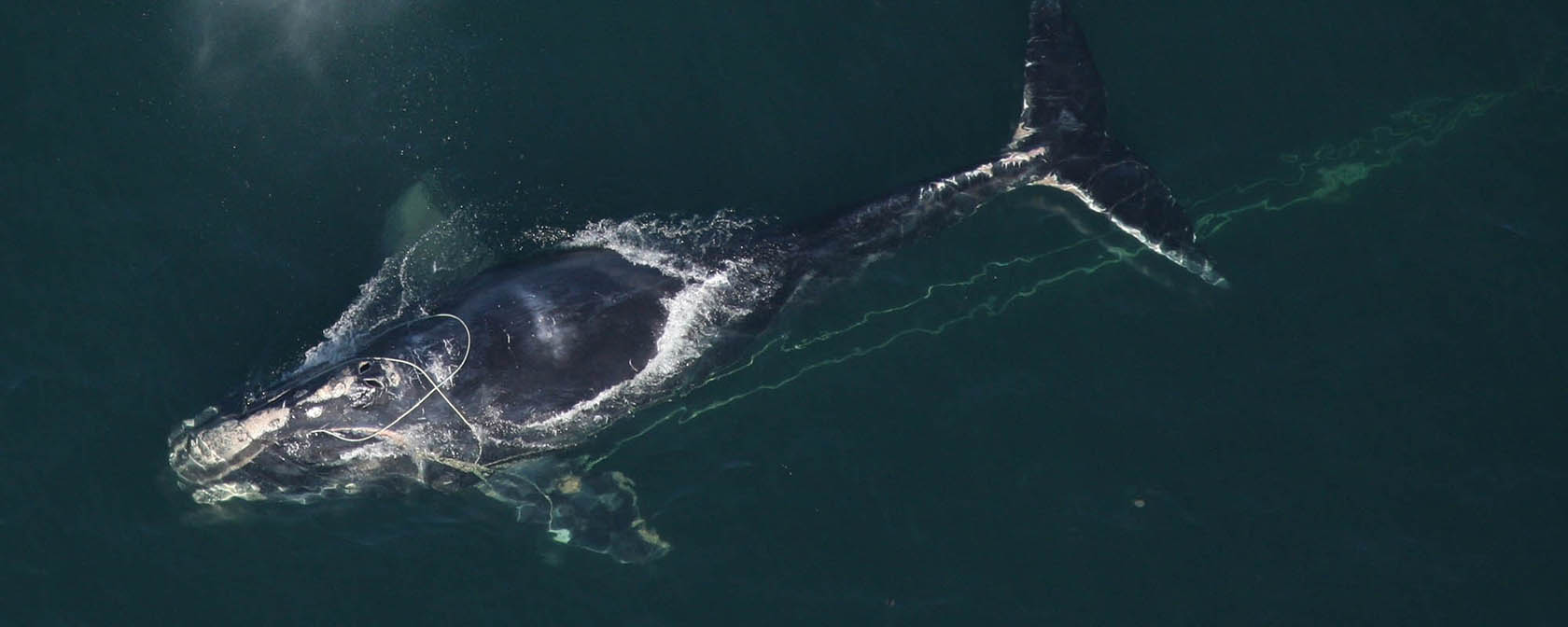By Sara Amundson and Kitty Block
The National Marine Fisheries Service today released a proposed rule intended to reduce the risk of critically endangered North Atlantic right whales getting entangled in heavy ropes used in fishing gear such as that used for catching lobsters and crabs. Unfortunately, this long-anticipated rule falls far short of the protections that are really needed to ensure these marine mammals do not disappear forever.
While any effort to save right whales is a step in the right direction, our government needs to do far better than this half-hearted proposal. The rule released today focuses on crab and lobster trap/pot fisheries in the northeast, which, the agency says, deploy about 93 percent of the buoy lines fished in areas where right whales are present. But what the agency is not telling us is that most of the measures proposed have not been proven to reduce the risk of right whales getting entangled in fishing gear. This would effectively mean that very few, if any, would be saved. To be truly effective, the NMFS needs to focus on expanding the size and timing of seasonal fishing closures in areas when right whales are known to be in those waters.
It is baffling that the agency has proposed such an inadequate rule, so late, when it is well aware that the loss of even a single right whale caused by entanglements or manmade causes increases the species’ risk of extinction. North Atlantic right whales are disappearing at an alarming rate, and scientists estimate that fewer than 360 are alive today. At least 45 right whales have died since just 2017.
Scientists have also determined that more than 85 percent of right whales have been entangled in fishing gear at least once in their lifetime, and 60 percent have been entangled multiple times.
The risk to right whales is from heavy ropes that drop down from buoys on the surface of the ocean. As the whales swim through the ocean, the ropes can get wrapped around their bodies, interfering with their ability to reproduce, eat and breathe. While whales sometimes die shortly after entanglement, they may also break free and drag these heavy ropes around and suffer for weeks, months, and sometimes years before dying of their devastating injuries.
Unless we deal with this preventable problem in a decisive fashion, we could lose right whales forever. That’s why the Humane Society family of organizations has made saving right whales a priority. Along with our coalition partners, we have been continually pushing NMFS to do more to reduce the number of lines in the water that entangle right whales, as well as protect the species from other threats. In 2020, we won a lawsuit against the agency on the grounds that it had failed in its legal obligation to protect the critically endangered North Atlantic right whale from risk of entanglements in lobster fishing gear, requiring the agency to put new protections in place by May 2021. Along with coalition partners, we also filed a legal petition requesting that NMFS use its emergency authority under the Marine Mammal Protection Act to expand existing seasonal closures of fishing gear as an interim measure while the agency works to finalize the rule it proposed today. We were part of another legal petition urging NMFS to put in place new regulations to protect right whales from being hit by ships and other vessels--the second leading cause of right whale deaths.
We have been urging Congress to provide additional funding for right whales and have helped secure $5 million for this effort for fiscal year 2021. We are also pressing for the passage of the SAVE Right Whales Act, S. 2453/H.R. 1568, introduced by Sen. Cory Booker, D-N.J., retired Senator Johnny Isakson, R-Ga., and Reps. Seth Moulton, D-Mass., and John Rutherford, R-Fla. The bill authorizes $5 million per year for research on North Atlantic right whale conservation over the next 10 years. We will continue to work with Congress to press for additional funding for conservation efforts to help this species.
Right whales live and migrate along the east coast of the United States and Canada, and saving them has to be a combined effort by these two nations. We are urging our federal government to continue conversations with Canada to ensure there are appropriate restrictions on risk-prone fishing gear used in Canadian snow crab and lobster fisheries. We have also directly requested that the Canadian government take action to protect the species.
NMFS has an opportunity, with this proposed rule, to create real change that would assure right whales have a future—an opportunity it appears to be squandering. As the new administration comes in and the agency works to finalize this rule, we strongly urge that this proposal be reconsidered and a concerted effort made to expand the size and timing of closures to risk prone fishing gear in areas we know are regularly used by right whales. Meanwhile, we will continue to work tirelessly to ensure that North Atlantic right whales are not lost forever.
Kitty Block is President and CEO of the Humane Society of the United States.




